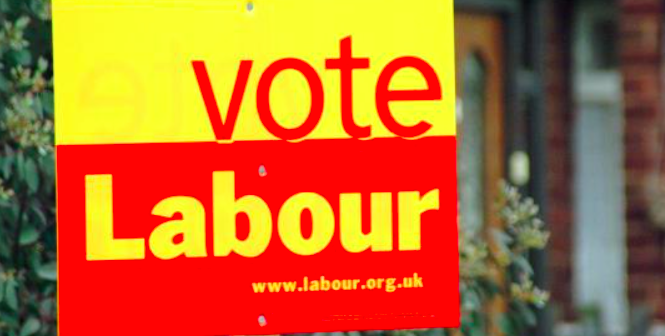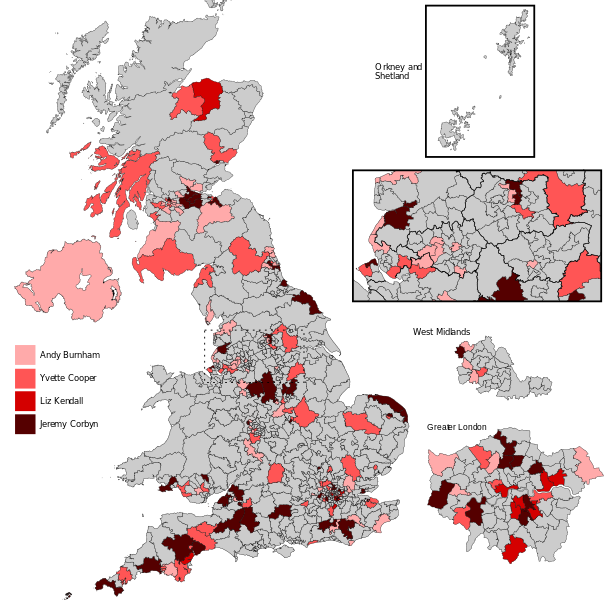UK: Who Will Lead Labour Out of the Shadows?

Following its disastrous performance at the 2015 General Election and the subsequent resignation of Ed Miliband, the British Labour party now has to choose between four candidates for leader, and a radical leftist is leading the polls.
Labour is in the process of electing a new Leader. The candidates who have successfully made it through the nomination process are the Shadow Health Secretary Andy Burnham, the Shadow Home Secretary Yvette Cooper, the Shadow Social Care Minister Liz Kendall, and the MP for Islington North Jeremy Corbyn. The contest looks set to be tight, however Burnham and Cooper are considered to be favourites, despite considerable press backing for the right-wing Kendall and a groundswell of support for the left-wing Corbyn.

2015 Labour Leadership Election Constituency Labour Party Nominations. Photo Credit: Wikipedia (MrPegnuin20) Creative Commons.
The outsiders
Kendall and Corbyn represent two extremes of Labour opinion. Kendall has made her pitch as a pragmatic modernising figure who “gets” the scale of the challenge facing Labour as it prepares for the next General Election, currently set for May of 2020. She has been unafraid to upset the party, advocating an uncompromising position on child poverty and cuts, and has adopted a forthright tone in challenging the party to be unsentimental about how it presents itself and opposes the majority Conservative government over the coming years. This has alienated her from all of the left and most of the centre of the party, with mocking websites such as ‘Liz Kendall for Tory Leader’ cropping up to lambast her supposed ease with Tory positions.
Corbyn, meanwhile, has benefited from adopting a stridently left-wing tone, speaking out about the iniquitous nature of the Government’s spending cuts and adopting traditional socialist positions. He unexpectedly received the backing of the country’s biggest trade union, Unite which has given him a significant boost, transforming him from an also-ran to a serious candidate. Somewhat bizarrely, the Conservative Party supporting Daily Telegraph has begun urging its readers to take advantage of new Labour leadership rules which allow members of the public to register as supporters in order to ensure that the “bearded socialist voter-repellent” consigns Labour to perpetual opposition. The 68-year old veteran seems as surprised as anybody by the strength of his campaign, and it is difficult not to draw parallels with the left-wing Vermont Senator Bernie Sanders who is giving Hilary Clinton a scare over the Atlantic.
Either of the ‘outsider’ candidates would probably prove disastrous as Labour leader. Kendall would alienate a large segment of the Labour Party, who – for better or worse – is not ready to embrace a Leader so willing to adopt Conservative positions. Additionally, she is inexperienced: having only been elected to the Leicester West constituency in 2010 with the help of her old boss Patricia Hewitt, she has little to commend her besides some well-received IPPR pamphlets and some competent speeches on the iniquities of social care provision. And while she is a fluent and competent media performer, she probably lacks the sufficient charisma to compensate for her meagre track record.
Corbyn, meanwhile, would almost immediately find his position untenable. Any Shadow Cabinet he appointed would immediately seek to moderate the positions on which he stood, while his election would undoubtedly trigger a rapprochement between the warring moderate Blairite and Brownite factions of the Labour Party. It is also fairly clear that he doesn’t particularly want to win, having essentially put down his decision to enter the race to it being “his turn” (after the left-wing candidacies of John McDonnell and Diane Abbott in 2007 and 2010 respectively). Whether he’d have the appetite for the numerous fights that his victory would provoke is also open to serious debate, and although he is polling strongly according to recent reports, he is probably unelectable, and there is no doubt that Britain’s powerful right-wing press would very quickly make his life a misery.
The insiders
Both of the mainstream candidates (Andy Burnham and Yvette Cooper) are experienced, with Cooper having held a panoply of government and opposition front-bench portfolios since her election as the MP for Castleford and Pontefract in 1997. She comes squarely from Labour’s Brownite mainstream, being comfortable with big business, but also a fluent and compelling voice on economic and social policy, as well as women’s issues. Since 2011, she has served as Labour’s Shadow Home Secretary, where she has won few friends in the party somewhat fruitlessly attempting to match – or at times outdo – the Conservatives traditionalist rhetoric on immigration.
Burnham, meanwhile, has spent much of the last three or four years attempting to curry favour with Labour’s affiliated trade unions, and has successfully sought to present himself as an enemy of increased private involvement in the UK’s National Health Service (despite a governing track record of ease with, or even advocacy of, the Blairite reforms in which the Coalition government’s changes have their origin). He received criticism from the Conservatives following the publication of a report on the NHS Mid-Staffordshire trust, in which hundreds of people were found to have died due to poor and neglectful care while he was Secretary of State for Health between 2008 and 2010. However, despite this baggage, he is probably Labour’s most fluent performer, and is helped by being handsome, from northern England, and of humble origins. Whether it would be enough to defeat David Cameron’s successor remains to be seen.
Ultimately, Labour will hope to find a leader who can hit the ‘sweet spot’ that Tony Blair so skillfully found between his election in 1994 and his second election victory in 2001. During this period, Blair was simultaneously able to speak for his party while appealing to the public. The 2001-2007 Blair was a different creature, revelling in upsetting his party and drifting ever further rightwards, eventually causing his own political demise. Liz Kendall seeks to pick up where he left off in 2007, while Jeremy Corbyn’s politics could have last been considered mainstream in the Labour Party in the mid-1980’s. It is therefore up to Burnham or Cooper, imperfect though they are, to repeat Blair’s trick, to build out from the party mainstream and broaden the party’s appeal, without creating enemies within their own camp.
The arithmetic is against Labour winning in 2020, but then again, it was against a Conservative majority this time. Labour’s best chance is with electing an insider, rather than an outsider.
Sean Kippin Managing Editor of Democratic Audit, LSE Public Policy Group. This article can be republished with attribution under a Creative Commons Licence.





